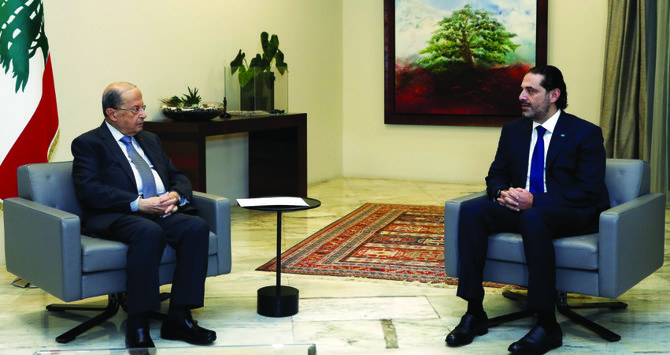
by NAJIA HOUSSARI — arabnews — BEIRUT: Hopes that Lebanese Prime Minister-designate Saad Hariri’s new government would be confirmed quickly were dashed on Thursday when President Michel Aoun presented his own counter-proposal to Hariri’s suggested Cabinet lineup of 18 ministers. Hariri stressed that he had selected “specialists with no partisan affiliations.” Mustafa Alloush, the vice president of Hariri’s Future Movement party, said: “Hariri has carried out his constitutional duties, and the ball is now in the court of the president and his team, especially his brother-in-law, the head of the Free Patriotic Movement, MP Gibran Bassil.” However, a statement issued by the Presidency of the Republic after Aoun’s meeting with Hariri said that Aoun “handed Hariri in return an integrated government proposal which includes a distribution of portfolios based on clear principles.” This indicates, according to commentators, that Lebanon’s “political dispute remains unchanged.”
Alloush said: “Hariri submitted an integrated government lineup of independent, nonpartisan ministers. It represents most of the sectarian components and respects the unity of standards as the political forces demanded, but it seems that President Aoun’s team, and especially Bassil, insist on being the obstructing third of the government while keeping specific ministries, such as the Ministry of Energy, and this is what Hariri did not and will not accept.” He added: “Hariri suggested Shiite ministers that would provoke neither Hezbollah nor the Amal movement.” Sources close to Aoun said that the president was “surprised that Hariri named all the ministers, including Christians, without consulting him.”
President of the Progressive Socialist Party Walid Jumblatt tweeted: “It appears the white smoke over the government will not be released soon as a result of further testing to adopt the best vaccine to deal with the crisis.” Jumblatt’s son Taymur, also an MP, met on Thursday with Naeem Hasan, the Druze Sheikh Al-Aql, and after the meeting he criticized the “nonconstitutional heresies that are disrupting the formation of the government and that encapsulate desires for quotas.” He warned against “persisting in this destructive approach that delays the launch of real reforms after the Lebanese people have lost four months since the tragic explosion at the port.”
Kataeb Party President Samy Gemayel was also critical of “the political class that throws weight on the shoulders of people, forcing them to bear the taxes and the high cost of living, while this class itself bears no responsibility of any kind.” Gemayel believes this political class cannot form a truly independent government. “The sooner you leave, the faster we will be able to rebuild the country,” he wrote on social media. “There is no choice but to produce a new parliament and a new political class that will restore the confidence of the (Lebanese) people and the international community and carry out real reform. It must be free from quotas and corruption.”



